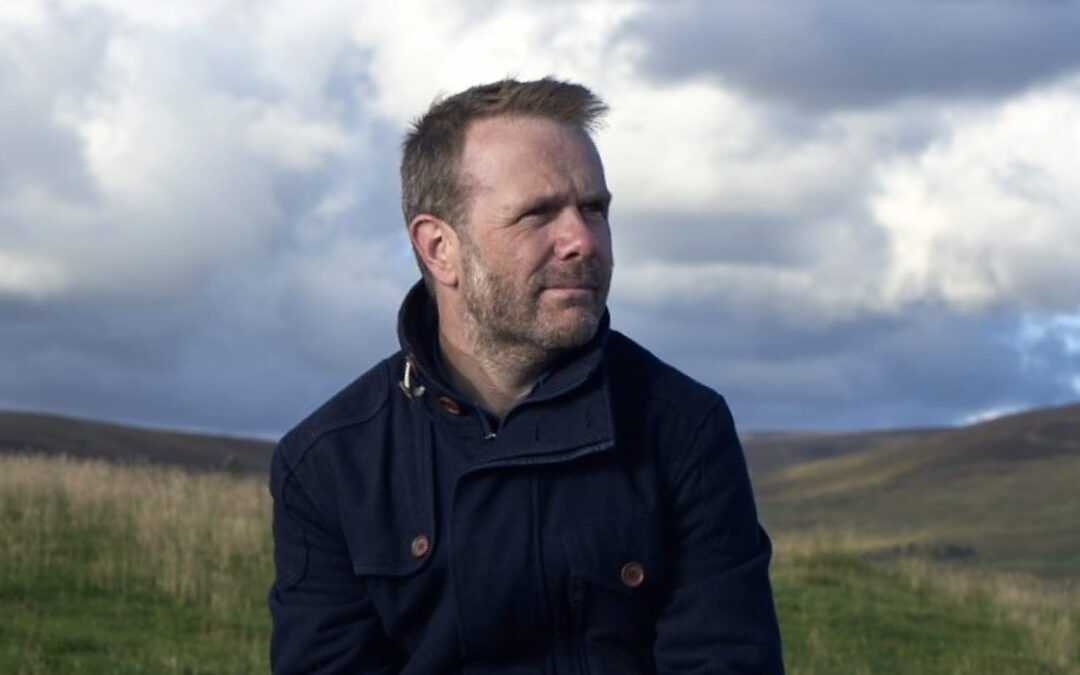7 October 2025
Andrew Michael Hurley is a short story writer and the author of four novels: Barrowbeck, Starve Acre, Devil’s Day and the Costa First novel award winning The Loney. Starveacre was adapted into a movie in 2024. Andrew’s latest novel is Saltwash which is published by John Murray on 23 October.
You can find Saltwash și celelalte cărți ale lui Andrew despre Catalogul Bibliotecilor Comunitare Suffolk.
Were you surrounded by books as a child?
Both my parents were teachers, so I was fortunate enough to grow up in a house full of books. I remember it being a huge pleasure to root through the shelves and see what I could find. There’s still something magical about picking up a book you weren’t necessarily looking for and being taken somewhere unexpected.
The Loney was your breakthrough book. It’s just over 10 years since it was published. How do you look back on it now?
With great fondness. I could never have predicted how well that novel was going to be received or how wide an audience it would reach. There have been so many lovely outcomes on the back of The Loney’s publication, not least that it’s enabled me to carry on writing and have a career as a novelist. I’ll be forever grateful to Tartarus Press for taking a chance and being the first to publish my work.
What is your writing routine and how has it changed over the years?
It depends where I’m up to with a particular writing project, but when I’m in the throes of wrestling with a novel it’s a case of putting in the hours. Unfortunately, there are no short cuts. So, I tend to start at around seven in the morning, read what I’ve got down so far, plan out what I need to do next, work until midday, have a lunch break, and then perhaps carry on for another couple of hours in the afternoon. Some days are productive, others aren’t. That’s a difficult thing to accept (all writers are incurable perfectionists) but I’m getting slowly better at trusting that my process will see me through eventually.
I suppose over the years I’ve learnt to be kinder to myself. I don’t set a daily word count target, I try to be patient and let the story unfold in its own time.
Ne poți spune puțin despre Saltwash and how you came to write it?
I started writing Saltwash during lockdown and so it’s taken quite a few years to pull it into its final shape, but it’s evolved into a story about guilt, forgiveness and mortality.
The plot, briefly, is that Tom Shift, seventy-five, has been recently diagnosed with a terminal illness and in signing up to a pen pal scheme, which aims to pair patients with similar illnesses, he begins corresponding with an Oliver Keele. Oliver is clearly well-read and erudite but also lonely and poor and so when he asks to meet at a place called Saltwash, Tom jumps at the chance to help him out in the hope that the good deed will alleviate some of the guilt he’s been carrying around all his life.
Saltwash asks some serious questions about mortality. Is this something you were aware of as you were writing or did the story guide you that way?
Right from the start, I knew that I wanted the main character, Tom, to be dying because it would give his quest for forgiveness additional urgency and compel him to move through a wide range of emotions: denial, disbelief, anger, guilt, benevolence and not a little terror of course. In fact, I became really interested in the various consolations that might be on offer to someone in his position. And so his first pen pal is a born-again Christian who has no doubt that she’s off to heaven.
Oliver frames his own death in poetic terms, as if he’s the tragic hero of a story. Another character encourages Tom to enjoy his time left in hedonistic abandon. And Astrid, who runs the group therapy at the clinic tries to persuade him that he is not a ‘self’ anyway and never has been and is only a physical expression of the energy of the universe. But none of these philosophies really help him to the answer the big question.
I particularly enjoyed the scenes with Tom and Oliver. How did their characters come together for you?
Tom took a while to develop into the character he is in the book, but Oliver came to me fully formed. He’s always been inherently gentle and affable, but an enigma too. His scholarly, donnish front is a means of endearing people to him and yet keeping them at a distance. He’s more apt to quote Shakespeare or Marcus Aurelius than give away too much about himself. So, even though he is loquacious, he’s very guarded about his personal life and his past – unlike Tom, who has shared practically everything with Oliver in a bid to confess (and be absolved from) his sins. Setting them up as opposites in that respect made for some interesting conversations on the page.
The covers of your books are always stunning and Saltwash is no exception. Do you have any influence over that?
None at all, but I’m blessed to have the book covers designed by the wonderful Sara Marafini who always captures the tone (and strangeness) of each novel so brilliantly. I’ve loved every single one.
Ce urmează pentru tine?
Having taken a bit of a break over the summer, I’m now starting to think about the next novel. All my stories have begun with setting and so I’d like to travel a little and see if I can find the next place of inspiration.
We’re always looking for our next great read. One book that you would recommend?
At the moment, I’m reading The Lamb by Lucy Rose. I won’t say much about it other than it opens with some severed fingers in a shower drain. It’s beautifully written grotesquery.
Ne poți spune un lucru despre tine pe care cititorii tăi s-ar putea să nu-l știe?
For a long time, I wanted to be an illustrator and went to art college for a year firmly set on that as a career, but I realised that everyone else there was actually quite good and so I hastily revised my ambitions. I still draw now, but purely for reasons of procrastination.

